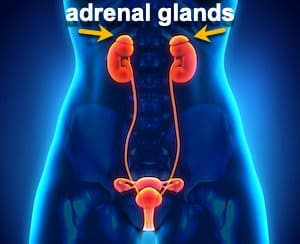Menopause (the ceasing of menstruation and reproduction) is a normal change that a woman will go through on average between the ages of 50 and 55 – although it can happen much earlier. Understanding the changes that happen in the body is vital, as natural decline in hormone levels during menopause can significantly affect a woman’s health for years to come.
The menopause process is gradual and has a few stages along the way. It starts as perimenopause, during which time the ovaries begin to make less of the hormones estrogen and progesterone, which interferes with an egg being consistently released each month. (By the way, the term menopause actually refers to when a woman has been 12 consecutive months without a period or other signs of fertility. Postmenopause is the stage after menopause has occurred. However many people use the term “menopause” to describe the entire process.)
The decline of hormone production starts slow (typically around age 35) and speeds up through her 40s as a woman approaches actual menopause. At some point during this transition, the ovaries get smaller and stop producing estrogen and progesterone altogether. At this stage, the adrenals take over the job of producing the sex hormones and menopause symptoms often become more pronounced.
The Problem With Diminishing Progesterone
The adrenal glands are widely known for the production of the stress hormones cortisol and adrenaline. But what many people  don’t realize is that the adrenals also produce other hormones, including the sex hormones estrogen and progesterone.
don’t realize is that the adrenals also produce other hormones, including the sex hormones estrogen and progesterone.
The adrenal glands are part of your long-term, back-up hormonal replacement part system and are designed to release whatever female hormone you may need. However, if the adrenals are not functioning well, sufficient progesterone won’t be produced which can cause havoc in the body.
The main purpose of progesterone is to prepare the body for pregnancy and provide the necessary support to ensure the fetus is carried to term. However, that is not the only role that progesterone plays in a woman’s body.
Progesterone is responsible for many important tasks, such as:
- increasing libido
- protecting against fibrocystic breast disease
- maintaining the uterine lining
- hydrating and oxygenating the skin
- decreasing hair thinning
- acting as a natural diuretic
- helping protect against depression and increasing a sense of well-being
- encouraging fat burning and the use of stored energy
- improving clarity
- promoting good sleep
Other Hormones Also Need Progesterone
Progesterone is also the precursors for other important stress and sex hormones (which means it’s needed to make other hormones). While estrogen levels don’t fall until later in the menopause transition, progesterone levels decline sooner and more dramatically leading up to menopause.
Body signals that include symptoms such as hot flashes are most likely the result in a shift in the balance between estrogen and progesterone.

The Impact of Stress on Progesterone
Another risk to progesterone is that the body releases cortisol in response to physical and psychological stress.
When we experience periods of stress, our bodies excrete cortisol to help us work through whatever the situation may be. If there’s a high demand for cortisol due to prolonged stress and the body is unable to keep up with the supply, it will take from cortisol’s pre-hormone, pregnenolone (the mother hormone of all sex hormones).
When more of pregnenolone is used to make cortisol, less will be available to make progesterone, which will further exacerbate menopausal symptoms and affect overall well-being.
The short-term results of stress may not be noticeable, but in the long run chronic stress can lead to adrenal fatigue. This sets the stage for increased inflammation in the body and lowered immunity, which creates numerous disease states.
Are YOU Suffering From Adrenal Exhaustion?
If you have been under constant stress for a prolonged period of time, you may be at the point where your adrenals are fatigued and your hormones are significantly out of balance.
Noticeable symptoms, such as weight gain, irritability, racing thoughts, chronic fatigue, and sleep disturbance are common in people who have adrenal fatigue. When adrenal fatigue is the primary cause of your low progesterone level, you need to focus on rebuilding your adrenal foundation.
Do you find yourself constantly fatigued and struggling to get out of bed in the morning? Do you feel unable to cope with stressful situations? If so, you might be suffering from Adrenal Fatigue Syndrome.
Answer These 18 Yes or No Questions
The more “yes” answers you have to the following questions, the more likely you are to have exhausted your adrenals:
- Do you have difficulty getting up in the morning?
- Do you have continued fatigue or low energy?
- Are your thoughts less focused; do you have brain fog?
- Do you have difficulty falling asleep or staying asleep?
- Do you crave salty, fatty, or sweet foods?
- Do you have blood sugars issues (hyperglycemia or hypoglycemia)?
- Do you have an afternoon slump between the hours of 2 and 5 pm?
- Do you often have muscle aches or pains for no apparent reason?
- Do you have an increased sense of irritability?
- Do you feel overwhelmed by all that needs to be done?
- Have you noticed an increase in belly fat and an inability to get rid of it?
- Do you have a decreased sex drive?
- Do you have low blood pressure?
- Do you have a low body temperature or feel cold all of the time?
- Do you have an increase in mood swings and or depression? Lack of enthusiasm?
- Do you experience dizziness when getting up quickly from a lying or sitting position?
- Do you suffer from increased allergies even if you have never had allergies before? Do you have food allergies?
- Do you have increased menopausal symptoms?
If you suspect you have adrenal fatigue, here are 6 ways you can do an adrenal fatigue test at home (and also consult with your healthcare provider!)
How to Support Your Adrenal Glands
The adrenal glands, just like the other glands in your body, need quality food to do their job effectively. It’s important to consume a clean diet loaded with organic fruits and vegetables that is devoid of artificial sweeteners and processed foods.
a clean diet loaded with organic fruits and vegetables that is devoid of artificial sweeteners and processed foods.
Daily detoxification is also essential. Cruciferous vegetables such as kale, broccoli, and cauliflower help detoxify the body.
Milk thistle can be helpful as it helps to break down and eliminate excess hormones and toxins. Be sure to drink plenty of water from a pure source. Your liver has to process any unused chemicals – the more toxins you put in your body, the harder the organs of detoxification have to work.
Stress reduction is also important as research shows that stress and anger are significant factors in menopausal symptoms and contribute to adrenal fatigue. Many women find they have more hot flashes and other symptoms when the adrenal glands are overworked by stress.
Electric and magnetic fields (EMFs) emitted from electronic devices (including your cell phone!) stimulate the body’s stress system, decreasing the ability to wind down and fall asleep. Once you finally do fall asleep, EMFs interfere with the deep sleep your body needs. Poor sleep also causes the adrenals to pump more cortisol, which keeps you awake longer and causes you to wake up after you fall asleep.
The bottom line is that women are systemically being told that their hormone levels are “within range,” but this is far from the truth. Further investigation with a healthcare professional fluent in hormonal issues is often required.
Feeding the adrenals, reducing your toxic load, supporting the liver, and addressing adrenal fatigue can help balance the hormones, which can actually make women healthier, happier, and more balanced during all phases of the menopause process.
13 Tips for Reducing Adrenal Fatigue
- Get 7-8 hours sleep every night.
- Heal the gut with probiotics and bone broth.
- Optimize liver function and detoxification with milk thistle and cruciferous vegetables.
- Get enough B5, also known as pantothenic acid, as it helps provide the extra energy your adrenal glands need to respond to stress and helps repair previous damage to these glands.
- Herbs such as Holy basil help to inhibit the release of cortisol and balance blood sugar levels.
- Reishi mushroom can help resolve the hormonal imbalance.
- Ashwagandha helps alleviate brain fog and memory problems associated with chronic stress and bring a sense of calm to the body.
- Walk briskly or engage in another exercise 4-7 hours per week, with a balance of cardio and strength training. (Go here to discover more about the Best Exercises for Women Over 50)
- Give yourself “me time” for at least one hour a day, which can include stress-relieving activities such as QiGong and Yoga Nidra, or simply taking a walk in nature.
- Consume a healthy diet including adrenal-supportive omega 3-rich foods.
- Keep a gratitude journal.
- Limit cell phone and computer use in the evening hours.
- Enjoy life, laugh more, and find joy in every day.
While the cessation of the menstrual cycle may be an inevitable transition all women go through, supporting your adrenal glands as early as you can in the process will have a huge impact on how you look and feel through menopause and beyond.
Organixx Clean Sourced Collagens blend contains five types of collagen from four sources. What’s more, it’s combined with targeted nutrients such as zinc, vitamin C, and vitamin B6 which specifically enhance the bioavailability and potency of collagen. Clean Sourced Collagens is formulated from the ground up to enhance and support your body’s natural ability to heal and rebuild itself from the INSIDE out.

Menopause, often referred to as “the change of life,” is something that all women will go through at some point. It’s the winding down of a woman’s fertile years and has no clear start or end point for most women. In perimenopause – the years leading up to actual menopause (which is 12 consecutive months without a period) – many women will begin to experience a host of symptoms as their hormone levels begin to fluctuate and eventually drop.
While mood swings and hot flashes are hallmarks of menopause, there are actually many signs and symptoms that women (and the men who care about them) need to be aware of. These can be both emotional and physical, and range from mild to severe.
Read on for 16 of the most common signs and symptoms of menopause and helpful tips for dealing with them. By the way, a “symptom” is something that you feel or experience. A “sign” is something someone else can detect in you. When it comes to hot flashes and mood swings, they are often both signs and symptoms!
16 Common Signs & Symptoms of Menopause
#1. Hot Flashes and Night Sweats
Hot flashes are a sudden sensation of warmth spreading through the body, particularly on the face and neck. They are typically brought on by declining estrogen levels. Night sweats are also caused by hormonal imbalance and can disrupt sleep.
Many women find that raising progesterone levels can alleviate these problems. Magnesium, zinc, and vitamins B6, C, and E  support the production of progesterone.
support the production of progesterone.
Ashwagandha, a powerful adaptogen, maca, licorice root, and other herbs are also known to boost low progesterone levels. You may also want to dress in layers during the day and sleep in a cold room with plenty of blankets you can kick off when needed.
#2. Mood Swings
Mood swings are due to hormonal changes as low levels of estrogen can cause irregularities in the brain. Estrogen increases serotonin, a chemical in the brain that boosts mood. As estrogen levels decline (and subsequently serotonin) one may feel less happy.
Relief can often be as easy as engaging in moderate exercise, spending time in nature, and engaging in deep breathing exercises – all of which promote a sense of calm and improve mood.
#3. Sugar Cravings
When hormones are out of balance cortisol levels to rise, which increases sugar cravings. High cortisol contributes to adrenal fatigue, which actually predisposes you to those cravings.
Ashwagandha supports adrenal function by reducing stress and lowering cortisol levels. Maca root also supports the adrenals. Holy Basil has been found to help balance cortisol, reduce cravings, and manage weight. Sleep deprivation will exacerbate cravings, so don’t skimp on the hours of rest you’re getting.
#4. Insomnia
The inability to sleep or stay asleep is one of the most annoying symptoms of menopause. Once again, hormonal imbalance is often to blame. Maintaining a consistent sleep schedule can help. Meditation and relaxing yoga can aid in clearing the mind for more restful sleep.
#5. Brain Fog, Memory Lapses, and Difficulty Concentrating
Feeling confused, forgetful, and/or finding yourself with a lack of focus and mental clarity? Once again, declining estrogen is to blame.
Drink more water and be sure your body is well-nourished. Concentrate on healthy sources of fats such as avocados, olive oil, oily fish, and seeds, which are needed for healthy hormone production.
#6. Anxiety &Depression
Depression and anxiety and can be due to unresolved childhood trauma. Consider working with a therapist to get to the source of the problem.
Before you resort to drug therapy, know that hormone imbalance can also be involved. When hormones shift and become out of balance, the result can be increased depression and anxiety.

#7. Weight Gain and Redistribution
The hormonal changes of menopause may make you more likely to gain weight around your abdomen than around your hips and thighs.
Menopause weight gain isn’t inevitable, however. You can reverse course by paying attention to healthy-eating habits and leading an active lifestyle, which can help revitalize the body’s metabolic rate.
Endocrine disruptors such as plastics and other chemicals mimic natural hormones and significantly contribute to weight gain. Ditch the plastic in your kitchen and use utensils and storage containers made from wood, glass, stainless steel, and natural materials.
A diet rich in cruciferous vegetables can help the body detoxify and flush out harmful chemicals. Milk thistle promotes liver health and regeneration which in turn helps the body to break down excess hormones, metabolize fat, and expel toxins from the body.
#8. Fatigue
Fatigue can be the result of hormone fluctuation, particularly declining estrogen. Supportive nutrition and restful sleep can help. Compounds in reishi mushroom may help decrease fatigue and help resolve the overall hormonal imbalance.
#9. Water Retention and Puffiness
Puffy feet, hands, and belly are often the results of the natural decline of estrogen and progesterone. Lemon water and roasted dandelion tea are natural diuretics. As counterintuitive as it might sound, drinking plenty of water throughout the day can help reduce bloat.
#10. Low Libido and Vaginal Dryness
Loss of libido can be caused by hormonal imbalance or by other symptoms of menopause such as vaginal dryness or depression. Vaginal dryness occurs when the moistness in the lining of the vagina disappears. When estrogen levels drop during menopause it causes a lack of lubrication.
The adaptogenic herb ashwagandha improves vaginal lubrication and encourages a calm and relaxed feeling. Non-toxic products such as coconut oil or over-the-counter non-toxic lubricants can also make sex more comfortable and enjoyable.
#11. Urinary Tract Infections (UTIs)
UTIs can often result from declining estrogen levels and changes in the urinary tract that make you more sensitive to infection. Immune-boosting foods, herbs, and supplements such as medicinal mushrooms, zinc, and vitamin D can be helpful. Be sure to drink plenty of pure water to help flush out bacteria.
#12. Hair Loss or Thinning Hair
Thinning hair is often caused by estrogen deficiency because hair follicles need estrogen to grow and stay healthy. Hair is also made from protein, which is why increasing your intake of collagen can be beneficial in maintaining thick, healthy hair.
#13. Headaches
Headaches during menopause are also linked to hormonal imbalance. As estrogen drops, headaches can become more frequent and may worsen. Turn to natural solutions when possible such as specific essential oils which can help with headache pain relief.
#14. Itchy Skin
Itchy skin is one of the first symptoms of menopause because collagen loss is most rapid at the beginning of menopause.  As estrogen levels drop, collagen production slows down. Supporting your body with collagen through consuming adequate protein and/or supplementation may be helpful.
As estrogen levels drop, collagen production slows down. Supporting your body with collagen through consuming adequate protein and/or supplementation may be helpful.
Amla berry is also known to promote healthy skin and to support the hormonal system.
#15. Osteoporosis and Bone Loss
Osteporosis and bone loss result from declining estrogen. Support bone density with low impact exercise (including strength training) and eating more green leafy vegetables such as spinach and kale. Vitamin K2 will help direct calcium out of joints and arteries and into the bones where it belongs.
#16. Irregular Heartbeat
An irregular heartbeat can be triggered by a decline in estrogen as this will over-stimulate the nervous and circulatory systems. This can cause irregular heartbeat, palpitations, and arrhythmias and can increase the risk of heart disease and high blood pressure.
A healthy lifestyle (including diet, exercise, and minimizing stress) that supports good heart health is your best bet.
Eating Well Matters Even More in Menopause
As you’ve seen repeatedly in the tips above, proper nutrition is one of the best strategies to minimize the symptoms of menopause and any negative impact they can have on the body.
A healthy diet will help balance your hormones, which in turn will support the adrenal glands which are responsible for producing your hormones once your ovaries stop.
Maintain a proper balance of protein, fat, and healthy carbohydrates. Eating 10-15 servings of vegetables daily (especially cruciferous vegetables such as broccoli, kale, and cauliflower) will help detoxify harmful chemical estrogens that can exacerbate menopause symptoms. It’s also highly beneficial to engage in moderate exercise and activities that help reduce stress, such as yoga, walking in nature, and meditation.
Organixx Clean Sourced Collagens blend contains five types of collagen from four sources. What’s more, it’s combined with targeted nutrients such as zinc, vitamin C, and vitamin B6 which specifically enhance the bioavailability and potency of collagen. Clean Sourced Collagens is formulated from the ground up to enhance and support your body’s natural ability to heal and rebuild itself from the INSIDE out.




